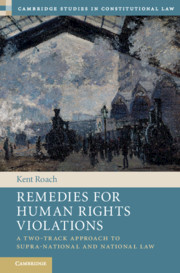Book contents
- Remedies for Human Rights Violations
- Cambridge Studies in Constitutional Law
- Remedies for Human Rights Violations
- Copyright page
- Brief Contents
- Contents
- Acknowledgements
- Table of Cases
- 1 The Importance and Complexity of Remedies
- 2 A Two-Track Approach to Individual and Systemic Remedies
- 3 Interim Remedies
- 4 Remedies for Laws That Violate Human Rights
- 5 Damages
- 6 Remedies in the Criminal Process
- 7 Declarations, Injunctions and the Declaration Plus
- 8 Remedies for Social, Economic and Cultural Rights
- 9 Remedies for Violations of Indigenous Rights
- 10 Conclusion
- Select Bibliography
- Index
6 - Remedies in the Criminal Process
Published online by Cambridge University Press: 29 March 2021
- Remedies for Human Rights Violations
- Cambridge Studies in Constitutional Law
- Remedies for Human Rights Violations
- Copyright page
- Brief Contents
- Contents
- Acknowledgements
- Table of Cases
- 1 The Importance and Complexity of Remedies
- 2 A Two-Track Approach to Individual and Systemic Remedies
- 3 Interim Remedies
- 4 Remedies for Laws That Violate Human Rights
- 5 Damages
- 6 Remedies in the Criminal Process
- 7 Declarations, Injunctions and the Declaration Plus
- 8 Remedies for Social, Economic and Cultural Rights
- 9 Remedies for Violations of Indigenous Rights
- 10 Conclusion
- Select Bibliography
- Index
Summary
Remedies in the criminal process are the most frequently awarded remedies. Part I outlines existing practices in international and select domestic courts. International criminal courts have more experience using alternatives to stays of proceedings or exclusion of evidence by awarding sentence reductions or damage awards, including for crime victims. Domestic courts often balance competing interests before ordering stays or excluding evidence but often not in a transparent or disciplined manner. Part II suggests that rather than relying on vague concepts of judicial integrity, courts should require the state to justify restrictions on remedies through proportionality reasoning. This should be based on legitimate state objectives, not including the seriousness of the offence charged but that does include the seriousness of the violation. Part III applies the two-track approach and argues that courts, subject to proportionality constraints, should focus on compensating for violations. This make sense of individualistic standing and causation requirements. Individual and systemic tracks are not watertight compartments. The court should consider whether the state has responded reasonably to the violation, including with respect to police training and discipline. Domestic courts should be more attentive to repetitive violations and the need to respond with cycles of individual and systemic remedies.
Keywords
- Type
- Chapter
- Information
- Remedies for Human Rights ViolationsA Two-Track Approach to Supra-national and National Law, pp. 295 - 351Publisher: Cambridge University PressPrint publication year: 2021



